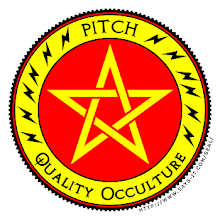
I did a brief review of Alston Chase's checklist of California Cosmology, Chase appearing to be the source for the term in thinking about today's Paganism.
I grew up in the rush and swirl of California Cosmology as it was taking shape in the post-WWII San Francisco Bay Area. My appreciation of Neo-Paganism and my own Craft practice draw deeply from California Cosmology.
But I think that California Cosmology incorporates plenty of elements that Chase doesn't mention in his checklist. What's more, I soaked up California Cosmology not simply by learning about grand concepts such as Zen Buddhism or Hinduism or self awareness exercises or ritual magic but also through experiencing specific places, people, processes, movements, and events. When I was growing up, the San Francisco Bay Area had a vibrant, creative, experimental, distinctive, and influential local/regional culture that not many years later ended up being submerged by an emerging national culture. The San Francisco Bay Area revealed--and reveled in--a world view very much its own.
Here's my working check list of the elements of California Cosmology [in no particular order of importance]--
- Ralph J. Gleason
- Herb Cain
- Ramparts magazine
- 1959 Shinryu Suzuki sits zazen; 1962 SF Zen Center founded
- 1954 City Lights founded, Lawrence Ferlinghetti
- Kenneth Rexroth
- San Francisco Renaissance and Beat poets
- Bohemianism
- Josephine Miles
- Elsa Gidlow--Druid Heights, Marin County
- Ansel Adams
- Free Speech Movement
- Lenore Kandel
- Dan O'Neill
- Anton LaVey and the Church of Satan
- John Muir
- West Coast labor movement, ILWU, Harry Bridges
- William O. Douglas
- The San Francisco Sound
- The Folk Revival
- International Workers of the World
- KPFA, Pacifica Foundation, Lew Hill
- Alan Watts
- San Francisco Mime Troupe
- North Beach nightclubs, comedy
- Human Potential Movement
- Environmental impacts of human activity
- Lively local radio and TV
- Latham Foundation for Humane Education
- The sciences of Biology and Ecology
- California Academy of Sciences
- Notable ethnic diversity, the presence of immigrant communities
- Family organic gardening
- Local bartering of goods and services
- The Civil Rights Movement
- The Anti-Vietnam War Movement
- Large universities and national research laboratories
- Landscape and geography of the region
- Gary Snyder
- Malvina Reynolds
- Companies sustaining technological innovation, e.g., Hewlitt-Packard and many others
- Mohandas Ghandi, Ghandian pacifism in politics, nonviolence in political action
- Zen Buddhism
- Hinduism and Yoga
- Lively and diverse popular occulture and esoteric community
- I AM Movement and other spiritual and/or occult communities
- UFOs
- Emerging Gay/Lesbian Rights Movement
- Renaissance Faire, Society for Creative Anachronism, medieval revivalism
- Critical examination of Christianity and many of its denominations, often by adherents
- Overall world view sustaining creativity, experimentation, wholism, systems thinking, and, probably, overconfidence in human abilities
And I could go on listing elements of California Cosmology as I, growing up, soaked it up. The challenge, for me, is trying to sort out which elements influenced me more and which influenced me when.
I have, for instance, written several blog posts about some encounters with living beings that happened to me at a very early age, long before I had any awareness of something I'd consider a cosmology or world view. These encounters had a telling influence on my later Neo-Pagan practice and outlook. But they were unique events.
Other experiences were not unique, yet they were limited as to time and place. The ways that Mare Island Naval Shipyard and the part that it played in my developing awareness of the human world and how it works is a good example. Other experiences were shared much more widely.
I think that California Cosmology has played an important part in the development of American Neo-Paganism. But I know that California Cosmology embraces a range of elements that go beyond a checklist like Chase's. California Cosmology has a distinctive political, economic, and technological dimension. Concern for well-being, reverence for life, and psychological/emotional/spiritual wholeness--plus an ambiguity or uncertainty regarding just how things fit together--influence the metaphysical dimension of the California Cosmology.
Powered by Zoundry Raven







